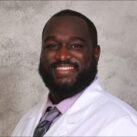This course is the first of two one-semester courses which together provide a complete, systems-based curriculum to enable the student to build a cognitive framework and knowledge base necessary to understand and medically apply normal human physiology and pathophysiology. Systems covered in the first semester include cellular physiology, homeostatic mechanisms, basic neuromuscular physiology, cardiovascular physiology, respiratory physiology, and renal physiology. Basic clinical skills, clinical reasoning, and physical exam skills are integrated throughout. This curriculum combines lecture with small group discussions, clinical correlations, case studies, independent study, projects, and simulation activities.
Rocky Vista University – MSBS Program Overview
Master of Science in
Biomedical Sciences
It’s your journey.
Let MSBS help you get there.
The MSBS program specializes in establishing a powerful academic foundation in biomedical science for students in all walks of life—no matter where you come from or where you plan to go in your medical career, the supportive community and application-based curriculum is designed to support your individual goals and needs along the way.
Why kick-start your medical professional career at RVU?
The Master of Science in Biomedical Sciences (MSBS) program at Rocky Vista University (RVU) is a Direct Pathway to RVU’s College of Osteopathic Medicine in Colorado or Utah. The direct pathway from MSBS to RVUCOM grants students admissions with:
- No MCAT Retake Needed
- No Additional Letters of Recommendation
- No Additional Prerequisites (including COM biochemistry requirement)
- No Interview (If 3.3+ MSBS GPA)
- No Undergraduate Overall or Science GPA Minimum
9
Months
Full time, in person
31
Total Credit Hours
$31,992
2025-2026 Tuition
98%
of 2024 class
accepted to healthcare professional programs (DO, MD, PA, or Other)*
Pursue your MSBS in Colorado or Utah
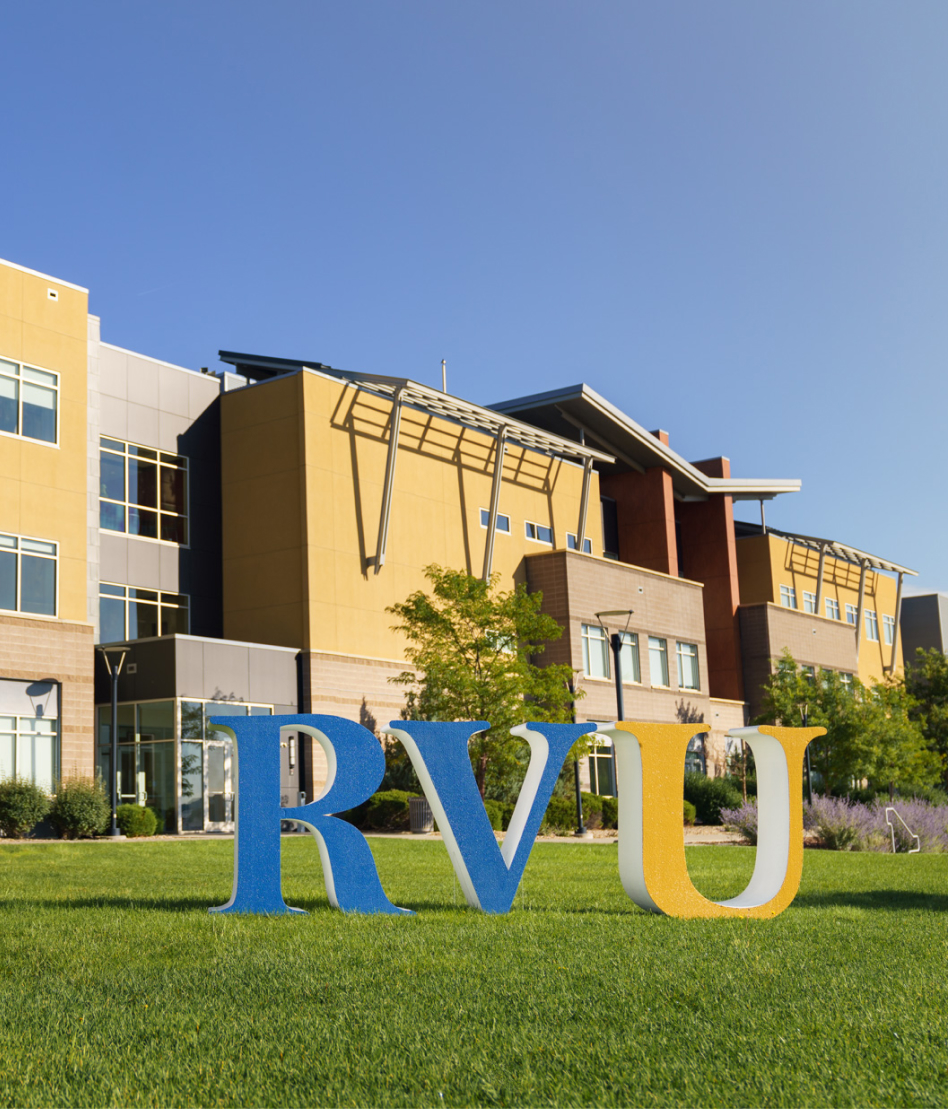
Colorado Campus
Colorado Campus
Rocky Vista University Colorado location is located in a small town called Parker, just 20 miles southeast of Denver, which is a place rooted in history and heritage. The spirit of the west that lives here is matched in character only by our embrace of forward-thinking innovation. This rare balance offers experiences that are unique even for Colorado, making Parker the ideal one-day getaway. The community is known for its excellent school system, extensive biking and jogging trails, recreational facilities, dining, and entertainment, as well as a wide variety of arts and community events held throughout the year.
Explore Campus
Utah Campus
Utah Campus
Our Utah campus is located in Ivins, UT, approximately 15 minutes from downtown St. George. The City of Ivins is a known as beneath the Big Red Mountain, which is where the campus is located. The weather is beautiful and sunny most of the year which makes it a great place for outdoor recreation, hiking, boating, camping, kayaking to name a few. There are several National Parks which are close to the campus; Zion National Park, Bryce Canyon National Park, and Grand Canyon National Park. Snow Canyon State Park is located just 5 minutes from campus which offers a beautiful landscape of red and white rocks.
Explore CampusMSBS Mission & Vision
Mission
The mission of the RVU Master of Science in Biomedical Sciences program is to provide the opportunity for students with all backgrounds to develop and strengthen critical skills in the biomedical sciences and to prepare them for their chosen careers.
Vision
The RVU MSBS program is a pivotal part of RVU’s growth and it contributes to RVU’s mission and vision as a major health sciences center comprised of a student population from various backgrounds, serving the Rocky Mountain West region.
The RVU MSBS program offers resources for students to achieve personal and academic success, including a) exposure to quality educators and researchers; b) a rigorous curriculum consisting of the application of active learning by faculty and students; and c) the requirement of individual responsibility.
The RVU MSBS program promotes life-long learning and competency in its students via its emphasis on the development of educational skills and critical thinking, and through the encouragement of scientific inquiry.
The RVU MSBS program curriculum and learning environment integrates a strong foundation of biomedical knowledge with the professional and ethical traits desired in its students and graduates.
Program Goals and Outcomes
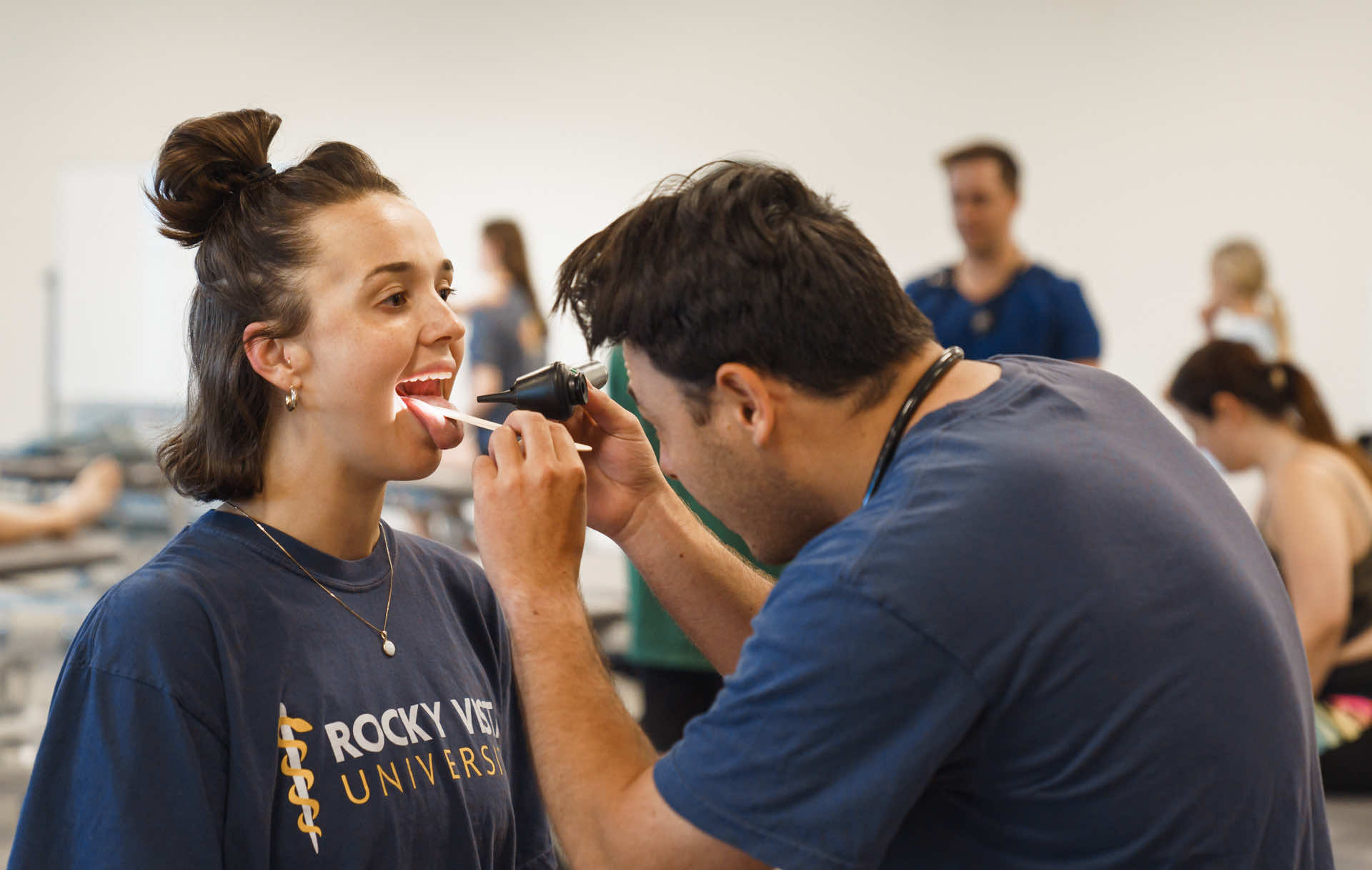
Program goals:
- To help graduates develop the requisite critical thinking skills and knowledge to satisfy a goal of entry into professional education and/or advanced degrees in the discipline
- To train graduate students in the principles and experimental methodologies of biomedical sciences as they relate to health and disease
- To aid students in attaining their placement and/or admittance goals into health-related professional education and/or advanced degrees in the biomedical disciplines
Unique features of the MSBS program at RVU:
- Courses are taught by current medical school faculty (PhDs, DOs, and MDs)
- Insightful, real-life case studies are widely integrated into the curriculum
- Community service learning is integrated into each semester
- Exams are in block testing format to prepare students for long exams, such as the MCAT and board exams
- Simulation experiences with medical students and standardized patients are included in each semester
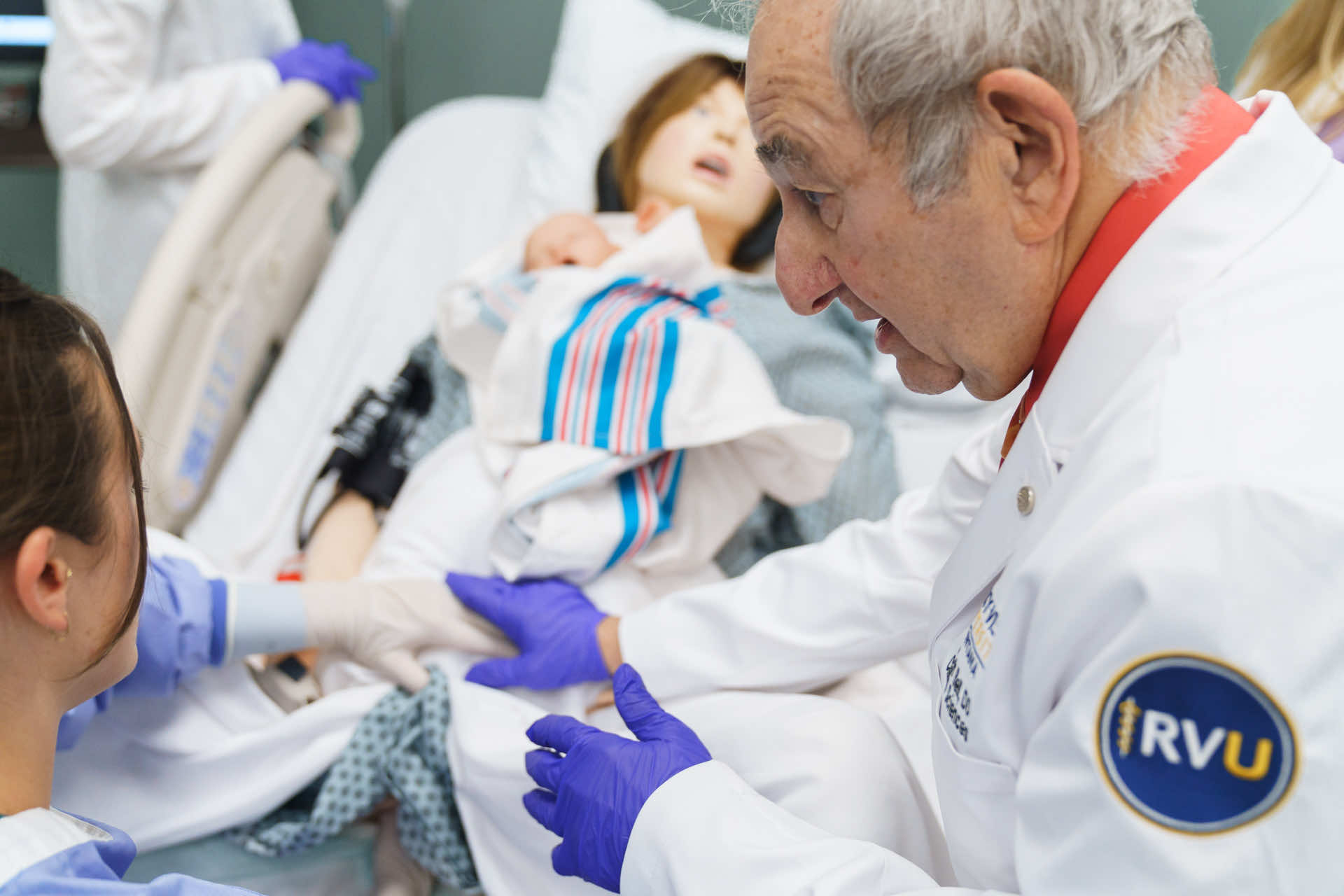
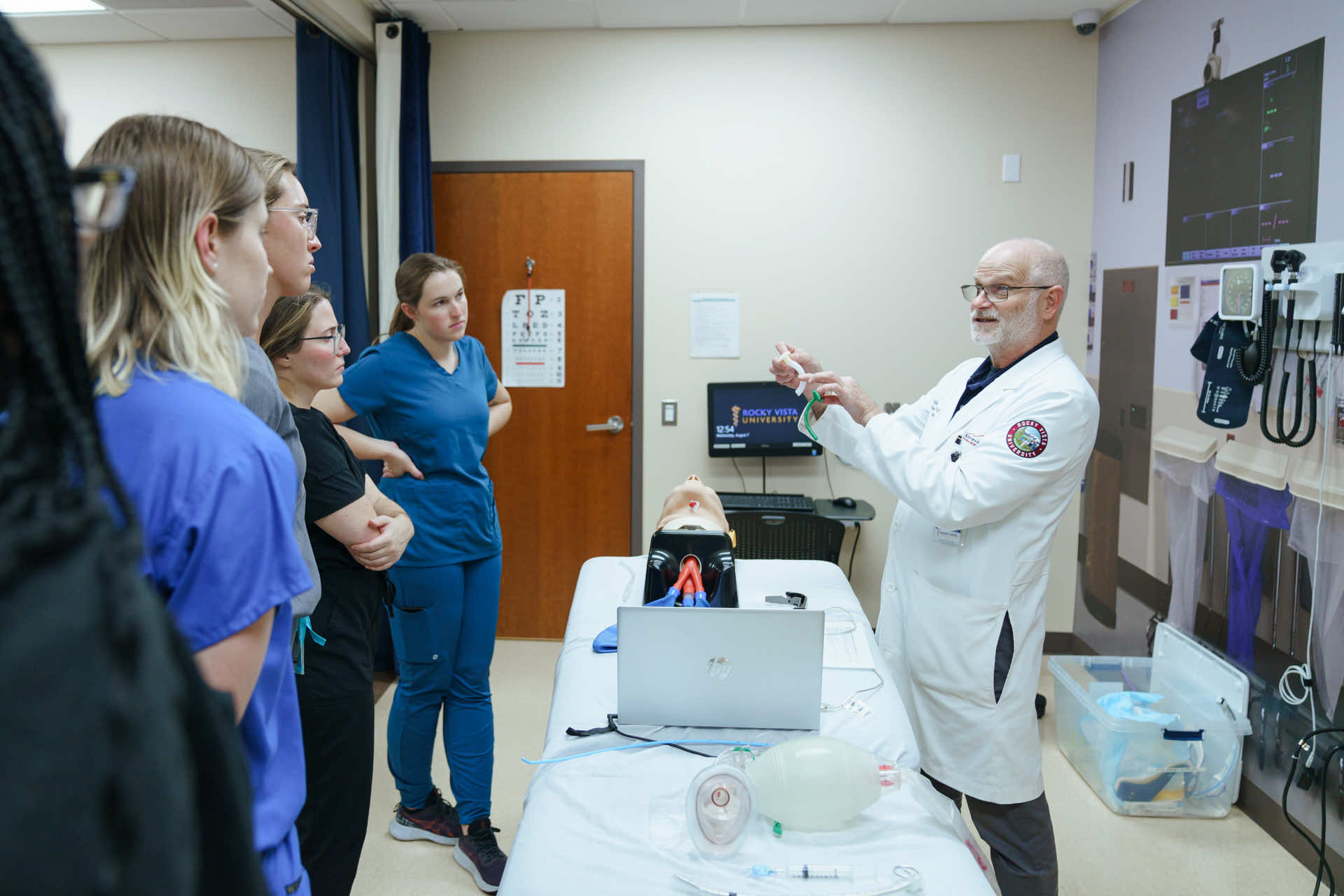
Together, we will help you learn to:
- Apply biomedical principles to health-related disciplines
- Solve problems utilizing evidence-based concepts
- Communicate effectively
- Cultivate compassion
- Embody the core virtues of the Master of Science in Biomedical Sciences program
Estimated costs for your MSBS Degree Program at RVU

Student Success Stories
98% of the 2024 MSBS class graduates were accepted to healthcare professional programs (DO, MD, PA, or Other)*.
Ready to apply?
The Rocky Vista University MSBS Program is currently accepting applications for the 2025-26 academic year. Head to our MSBS Admissions page for more specifics on the admissions process.
Application Requirements
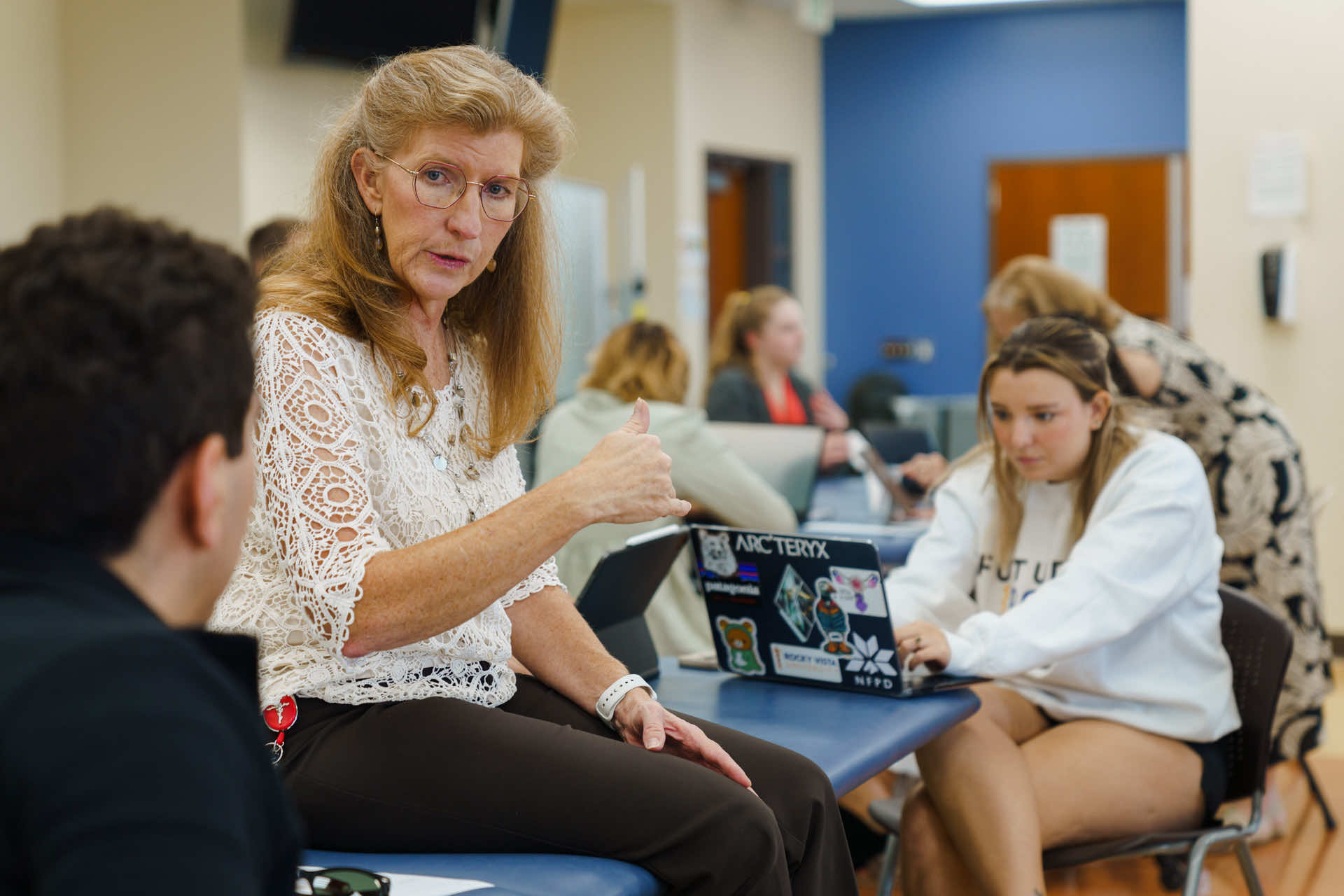
To apply for the Master of Science in Biomedical Sciences (MSBS) program, you must meet the following minimum requirements:
- A bachelor’s degree from a regionally accredited college or university
- Completion of all prerequisite coursework (see below) with a grade of ‘C’ or better:
- Biology with lab: 8 semester hours
- General chemistry with lab: 8 semester hours
- Organic chemistry with lab: 8 semester hours
- Physics with lab: 8 semester hours
- English composition or Literature: 6 semester hours
- An overall cumulative and science GPA of 2.6 or higher (on a 4.0 scale)
- Official standardized test scores: *MCAT, GRE, PCAT, or DAT (There is no time limit for the standardized test score, and other standardized tests may be potentially approved upon request)
- Completed application via PostBacCAS
- Resume including all relevant volunteer and paid work experience, along with service and leadership activities
- Two letters of recommendation from individuals who can attest to your suitability to attend a graduate program in biomedical sciences.
- Appropriate references include healthcare professionals, pre-health advisors, basic science faculty members, and employment supervisors.
- Applicants are strongly encouraged to include letters from multiple categories (e.g., one letter from a health care provider and another from a basic science faculty member). Please refrain from requesting letters from family members or friends.
- MSBS will consider international applicants. Demonstrated English language proficiency is required; preference will be given to applicants who have previously attended a regionally-accredited college or university in the U.S.
*A competitive MCAT score for our program is 495, but we consider the each application holistically. If your score is below this, we still encourage you to apply and share your unique strengths.
MSBS Program Curriculum
The Master of Science in Biomedical Sciences (MSBS) program’s innovative curriculum is designed to graduate skilled students prepared for success in a doctoral training program in a health sciences field. The program emphasizes key collaboration between many disciplines and combines classroom learning with clinical application.
BMS 5041: Physiology I (4 credits)
BMS 5060: Microbiology (3 credits)
This course introduces graduate students to fundamental principles of microbiology including microbial structure/diversity, microbial metabolism and pathogenicity, and classes and actions of antimicrobial drugs. This overview includes discussions of the interaction between pathogen and host during the infectious process and adaptations by the pathogens to overcome or evade the immune system and cause human disease. Representative microorganisms belonging to each class of pathogen (bacterial, viral, fungal, and parasitic) are discussed. Other topics will include emerging diseases, public health epidemiology, vaccines, antimicrobial resistance, and eradication of disease. A combination of methods will be used to deliver material including, but not limited to, didactic lectures, small group work, and case studies/applications.
BMS 5021: Molecular Basis of Medicine I (2 credits)
This course is the first semester of a two-semester course that incorporates a multi-disciplinary approach to investigate fundamental biomedical concepts. The objective of the course is to promote student learning of the biochemical, molecular, and cellular mechanisms underlying normal physiology and metabolism, thus providing a foundation for understanding disease processes. The course provides a foundation in cellular and molecular biology, including cell structure, cellular macromolecules, DNA and RNA structure and function, protein synthesis, genetics and regulation of gene expression, flow of genetic information, energetics, metabolism, and the regulation of selected cell activities.
BMS 5051: Anatomy I (2 credits)
This is the first of a two-semester course encompassing all aspects of human functional anatomy and clinical gross anatomy. This course will focus on the gross anatomy of all systems in the human body. In addition, imaging techniques such as x-ray radiography, CT scans, and MRI emphasizing structural relationships will introduce students to a clinical perspective of the structure of the human body. Course objectives include the acquisition of anatomical structural knowledge, the development of oral presentation and written communication skills, as well as the development of critical assessment of biomedical literature. Students will experience hands on learning with cadavers dissection. Learning is facilitated through lecture, team problem based learning, and clinical case presentations.
BMS 5031: Scientific Inquiry for Healthcare Professionals (1.5 Credits)
What is the scientific method? What is the value of primary versus secondary sources of medical information? How does one separate reputable information from questionable sources? This introductory course introduces students to the scientific method, the distinct value of primary and secondary information sources, and important concepts such as incidence, prevalence, probability reasoning, and statistical inference. Students will be challenged to interpret data, evaluate research findings, and draw evidence-based conclusions. Through collaborative, team-based learning, students will explore social determinants of health, revealing the profound impact of social factors on individual and community health. Recognizing the multifaceted nature of healthcare, the course encourages students to consider diverse perspectives, including patient experiences, cultural contexts, and ethical implications.
This course will be available AY 24-25
BMS 5012: Foundations of Success (FOS) (1 credit)
This course is designed to introduce students to the foundational skills necessary to be a successful graduate student. This course will focus on a variety of techniques to increase student confidence and develop graduate level study skills, and professionalism. It will cover principles of learning strategies, problem solving, note-taking, test-taking, critical listening and thinking, self-assessment, goal setting, and time management.
BMS 5008: Medical Humanities (1 credit)
The Medical Humanities course examines the relationships between the humanities and biomedical sciences. Topics vary by year and include, but are not limited to, communication, implicit bias mitigation, human subject research history and ethics, professional identity formation, illness narratives. This course is grounded in a variety of literary and textual sources and involves small and large group discussions, collaboration, written analyses, service-learning, and critical reflection, all of which are intended to foster self-examination and compassionate behavior.
BMS 5061: Healthcare Ethics (0.5 credits)
Healthcare Ethics provides students the opportunity to strongly discuss and apply ethical principles to medical practice, healthcare policy, and biomedical research. This course is discussion-focused, with pre-reading and videos to help orient students on the topic at hand. In-class questions and cases will open up dialogue between fellow MSBS students as well as the with course instructors. At the end of this course, students should understand ethical policies, principles, and topics related to the Medical Humanities course, in order for students to better apply ethical dimensions to medical cases.
This course will be available AY 24-25
BMS 5042: Physiology II (4 credits)
This course is the second of two one-semester courses which together provide a complete, systems-based curriculum to enable the student to build a cognitive framework and knowledge base necessary to understand and medically apply normal human physiology to pathophysiology. Systems covered include the gastrointestinal system, endocrine system, reproductive system, neurophysiology, biomedical ethics, and other advanced topics. Basic clinical skills and clinical reasoning are integrated throughout. This curriculum combines lecture with clinical correlations, case studies, independent study, projects, simulation activities, and a cumulative capstone.
BMS 5002: Biomedical Pharmacology (3 credits)
Biomedical pharmacology presents an overview of the basic concepts and principles of pharmacology. Students explore mechanisms of drug action, pharmacokinetics, pharmacodynamics, pharmacogenomics, and toxicology. Additional classroom sessions highlight the basic and clinical pharmacology of agents that exert effects on a variety of physiologic systems including the heart and vasculature, the neuromuscular junction, and the autonomic and central nervous systems. Students will be required to complete a drug capstone project demonstrating their ability to work on a team, appropriately review and synthesize recent medical literature, and deliver an oral presentation. Successful completion of this course will prepare students for doctoral level study of pharmacology.
BMS 5070: Immunology (3 credits)
This course is designed to introduce students to the foundational knowledge necessary to understand the normal and abnormal functions of the immune system. Immunological principles involving innate and adaptive immunity, host responses to pathogens, blood groups, immunopathology, immunodeficiencies, autoimmunity, vaccines, transplantation, classes and actions of immunologically active drugs, and targeted immunotherapies will be discussed. Didactic lectures, small group discussions, clinical case studies, designated reading assignments, flipped classroom and application sessions will be utilized in this course. In addition, there will be an interdisciplinary component to this course in the form of service learning and critical reflection.
BMS 5010: Journal Club (2 credits)
The goal of this course is to provide MSBS students the opportunity to evaluate and investigate evidence through critically reading, interpreting and presenting research from the primary literature. This course helps students stay abreast of current knowledge in various fields and develop skills in critical analysis of research in the biomedical sciences. Topics will include advances across biomedical and clinical research. Emphasis is placed on developing skills in critical review, presentation and teaching skills, and in communicating scientific studies in a seminar format.
BMS 5052: Anatomy II (2 credits)
This is the second of a two-semester course encompassing all aspects of human functional anatomy and clinical gross anatomy. This course will focus on the gross anatomy of all systems in the human body. In addition, imaging techniques such as x-ray radiography, CT scans, and MRI emphasizing structural relationships will introduce students to a clinical perspective of the structure of the human body. Course objectives include the acquisition of anatomical structural knowledge, the development of oral presentation and written communication skills, as well as the development of critical assessment of biomedical literature. Students will experience hands on learning with cadaver dissection. Learning is facilitated through lecture, team problem based learning, and clinical case presentations.
BMS 5022: Molecular Basis of Medicine II (2 credits)
This course is the second of a two-semester course that incorporates a case- based approach to investigative fundamental biomedical concepts. The objective of the course is to promote student learning of the biochemical, molecular, and cellular mechanisms underlying normal physiology and metabolism, thus providing a foundation for understanding disease processes. The course provides a foundation in cellular and molecular biology, including cell structure, cellular macromolecules, DNA and RNA structure and function, protein synthesis, and regulation of gene expression, energetics, metabolism, regulation, organization and function of cellular organelles, flow of genetic information, and the regulation of selected cell activities. Prerequisite: none.
Program FAQs
Can I apply to both the MSBS and DO program at the same time?
Can I be in progress with prerequisite coursework while applying?
Yes, however, applications will not be considered until all pre-requisites are completed or in progress. All requirements must be completed and reported with an official transcript and/or score report prior to matriculation.
Can I transfer or can RVU access my documents and materials from last year’s Master of Science in Biomedical Sciences (MSBS) or AACOMAS application?
All applications must be completed via PostbacCAS. We are not able to pull any documents or application materials from a previous Master of Science in Biomedical Sciences (MSBS) or AACOMAS application. Here is the link to the application.
Can I work while being in the Master of Science in Biomedical Sciences program?
MSBS students are strongly encouraged to not work during the program so they can focus on their studies.
Can standardized test scores be released electronically to PostbacCAS directly?
They need to be self-reported on the application. An official score report can be sent directly to [email protected] upon acceptance.
Do you need an official standardized test score when I apply?
A standardized test score must be self-reported in order for the application to be reviewed by the Master of Science in Biomedical Sciences (MSBS) Admissions committee. An official score report is required once an applicant is accepted to the program.
How do I gain admittance to RVU-COM?
Students must meet academic and professional requirements to be entered into out RVUCOM pipeline. All students accepted must meet rigorous academic and professional requirements.
How long does it take to receive a response from the Master of Science in Biomedical Sciences (MSBS) department once I’ve submitted my application?
We can only consider your application after it has been marked as “Verified” in PostbacCAS. After this, it typically takes 4-6 weeks to receive notification from us, but this timeframe can change depending on the number of applications being reviewed and when the Admissions committee is scheduled to meet.
How many students are accepted each year from the Master of Science in Biomedical Sciences program into the RVUCOM?
Historically, we have graduated over 200 students, and approximately 95% of them have been accepted or are currently attending medical or PA school.
How many students are accepted into the Master of Science in Biomedical Sciences program?
Although variable from year to year, there are approximately 25 seats available in Utah and 65 in Colorado.
How much interaction/contact is there between Master of Science in Biomedical Sciences students, DO students and PA Students?
There are two joint courses, one between MSBS and PA, and one between MSBS and DO. There are standardized patient encounters involving COM year 2 students and MSBS students. In addition, MSBS Alumni serve as peer mentors and tutors. MSBS students can be members in the medical school clubs. Most student activities, such as the Gala, are for all students.
Is there a minimum score?
There is no minimum score for any of the qualifying tests: GRE, MCAT, PCAT, or DAT. Other standardized tests may be considered upon request.
Is there a separate supplemental application with more questions?
The RVU supplemental questions are included on the PostbacCAS application.
Is there an MCAT prep course offered with the Master of Science in Biomedical Sciences program?
No, there is no MCAT prep course offered. Generally, the MSBS course schedule is four days per week, with one day free for studying and professional development.
What can I do with an Master of Science in Biomedical Sciences degree?
Most students pursue this degree in preparation for medical school. Other vocational opportunities are available with an Master of Science in Biomedical Sciences degree. Some of these include research, teaching, laboratory work, clinical trial coordination, and others.
What is the preferred way of having letters of recommendation submitted?
All letters must be submitted through PostbacCAS.
What is the typical course schedule?
Although course times vary, courses are typically scheduled Monday – Thursday between 8:00 am – 5:00 pm.
What kind of time commitment can I expect for the Master of Science in Biomedical Sciences program?
The MSBS program is a 9-month program, the students are considered full time, in-person attendance, Monday-Friday
What specific type of healthcare professional can write me a letter of recommendation?
We recommend requesting letters from a physician (MD/DO), RN, NP, PA, PT, dentist or podiatrist trained or practicing in the US. Other healthcare providers may be considered with explanation.
When is the application deadline?
Applications can be submitted through PostbacCAS from September 1st through July 26th before classes start (see PostbacCAS website for details). The Master of Science in Biomedical Sciences (MSBS) Program is on rolling admissions, so applying as early as possible is to the applicant’s benefit. We sometimes accept students up to the time of matriculation.
Why have I not received any email or information since my application was verified several days ago?
The Office of Admissions will process applications in the order they are received; the timeframe will depend on volume of applications and other factors throughout the cycle. You will be notified by email if you are missing any documentation.
Will you accept online and community college coursework to meet the prerequisite requirements?
Yes, although we recommend taking at least a few upper-level biomedical sciences courses at a four-year university, which helps the Admissions Committee gauge the applicant’s ability to succeed in the Master of Science in Biomedical Sciences (MSBS) program.
Explore more program information
MSBS Direct Pathway to RVUCOM
College of Osteopathic Medicine
MSBS students interested in applying to RVUCOM (Colorado or Utah location) will be evaluated by the MSBS faculty at the conclusion of each semester. A recommendation to the COM Admissions Committee will be made regarding the student’s academic aptitude for success in the COM and suitability to advance the mission and vision of RVUCOM. MSBS students recommended by the faculty of the MSBS Program will be evaluated by the RVUCOM Admissions Committee, which will make a recommendation to the Dean who will make the final decision regarding acceptance. Matriculation to the COM is contingent upon the successful completion of the MSBS Program and all graduation requirements. RVU does not guarantee acceptance into any of its programs and will consider as many or as few MSBS students for admission as it deems appropriate.
Students recommended to the COM by the MSBS Program faculty will be required to submit an AACOMAS application in the fall and will submit MSBS grades once the fall grades are posted. Candidates interested in RVUCOM’s program should start their AACOMAS application as soon as possible and submit, at the latest, as soon as fall grades are posted. The MSBS Program Director (or designee) will write a summative letter representing the collective recommendation of the MSBS Program faculty. Recommended students may not be required to submit a supplemental application or interview for the RVUCOM. RVUCOM minimum MCAT requirements or minimum GPA requirements may be waived for students recommended by the program. Students considering programs outside RVU are encouraged to become familiar with the admissions standards of those programs to ensure requirements are met.
Students interested in applying to the RVUCOM (Colorado or Southern Utah location or both) will be given the opportunity to designate their preferences via the supplemental application.
Physician Assistant Program
At this time, the RVU PA program does not accept advanced placement or special admissions practices for any individuals or groups. Please see the PA program webpage for admissions information and requirements.
Accreditation
All RVU programs are accredited by the Higher Learning Commission:
Higher Learning Commission
230 S. LaSalle Street;
Suite 7-500;
Chicago, IL 60604
Phone: (800) 621-7440
Message from the Program Director

Welcome to Rocky Vista University’s Master of Science in Biomedical Sciences program.
We’re glad you’re exploring RVU as you take the next step toward your future in healthcare. Our MSBS program is intentionally designed to challenge and support you – strengthening your academic foundation while preparing you for medical, dental, PA, or other healthcare professional schools.
You’ll dive into rigorous coursework grounded in real-world application, including patient cases that help bridge science with clinical relevance. Along the way, our award-winning faculty will guide and inspire you, encouraging critical thinking, curiosity, and personal growth.
At RVU, we value professionalism, compassion, and integrity, and we’re proud of the unique perspectives and worldviews that our students bring to the classroom. You’ll be part of a collaborative, mission-driven community that is committed to your success.
We look forward to seeing what you’ll accomplish as part of the MSBS legacy—and we can’t wait to welcome you to RVU.
Sincerely,
Francina D. Towne, PhD

Program Director of Master of Science in Biomedical Sciences
Professor of Immunology
Rocky Vista University
MSBS Technical Standards
Rocky Vista University (RVU) maintains a strong institutional commitment to equal educational opportunities for qualified applicants and students with disabilities. We collaborate with students to develop innovative ways to ensure accessibility and strive to create a respectful, accountable culture through our confidential and specialized disability support. Technical standards are required to engage in the program fully. Students’ competency related to learning objectives throughout and pertaining to their level of education will be addressed by the individual program.
Hear from current MSBS students at RVU
Andy Chen
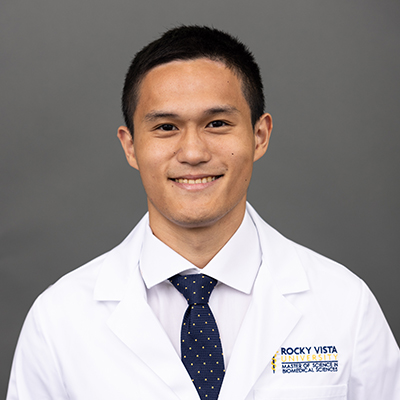
MSBS Class 2025
Utah Campus
Where is your hometown?
Albertson, New York
Undergraduate studies:
Nursing
Tell us a bit about yourself.
I’m originally from Albertson, New York, where I was raised with my younger sister by amazing parents. My journey all started as a volunteer at my local ambulance agency, and let’s just say I’ve been hooked on the adrenaline ever since—apparently, I thrive when sirens are blaring and when people are running the other way. I balanced being a full-time student while working in many aspects of emergency medicine outside the hospital and inside the hospital. I even took on leading the ambulance corps to continue serving my community. I graduated from the New York Institute of Technology with a Bachelor’s in Nursing in 2023, and since then, I’ve continued gaining experience in healthcare and research. I’m super passionate about medicine and service, and that’s what’s fueled my wild ride so far
What initially brought you to RVU? Why did you decide to pursue this degree?
I was determined to become a physician until my MCAT came back and, well, let’s just say it crushed my medical school dreams faster than you can say “standardized testing.” Feeling lost and trying to pick up the pieces, I stumbled upon a random Reddit post. It mentioned RVU’s Master of Science in Biomedical Sciences. Intrigued, I did some research on the program. The program’s reputation for hands-on, practical education and focus on preparing students for medical careers sold me. I had been doing post-baccalaureate work to beef up my science game, and after chatting with Dawnett—whose advice was the final push—I knew RVU was the perfect place to test my limits and steer me back toward my goals. It was all about building a stronger foundation for my future in medicine. Although my nursing background did give me a solid start, I wanted to dive deeper into the science behind it all. RVU’s MSBS program helped me bridge the gap between patient care and the science that drives it, and I was sure this was going to set me up to pursue my dream in medicine.
What do you enjoy doing when not at RVU (family life, interests and hobbies)?
I love the outdoors—it’s my go-to way to recharge and clear my head. I’ve been passionate about hiking since I was a kid, and I have lost count of how many times I have climbed our very own Red Mountain. Camping is another passion of mine; there’s nothing quite like setting up a tent, lighting a fire, and unwinding under a starry sky. Beyond that, I find a lot of solace in growing closer to my faith as a Catholic, which has given me a deeper sense of peace and purpose, especially while being so far from home. I also make it a point to talk with my family back home whenever I can; they keep me tied to my roots and inspire me to keep pushing forward.
What is an interesting or little known fact about you:
Both of my parents were born and raised in China, and I am very proud of that heritage. Growing up, I had the opportunity to travel back there many times alone starting when I was just 11 years old—imagine a wide-eyed kid taking on international flights—it was thrilling and shaped me in a big way. I can understand and speak Mandarin fluently, thanks to hearing it at home and honing it over the years. When I’ve spent extended time with relatives in China, it flows even more effortlessly—immersion truly makes a difference. I want to use that fluency to advocate for non-English speakers, helping them navigate the American healthcare system with confidence.
What is the best piece of advice you have been given by a professor or student while at RVU?
The best advice I’ve gotten at RVU came from Dr. Terwoord and Dr. Roberts, who told me that when I’m facing big life decisions, I should first check in with the core pillars that define who I am—my values, my passions, my roots—and then make those choices with full confidence, no second-guessing. They urged me to let go of any regrets about what might’ve been and shift my gaze to what lies ahead. That advice hit deep—it made me look back at the time I took a leap and moved across the country to chase my dream when starting this program, leaving behind the familiar for a shot at something that felt so right.
What are your medical interests?
I often find myself reminiscing about the high-stakes world of emergency medicine—those moments when the rush of split-second decisions and the flood of adrenaline kept me captivated. However, since starting the MSBS program at RVU, I’ve started to see the appeal of other medical fields in a new light, like the brain-teasing complexity of specialties such as cardiology or neurology that’s got me intrigued. This program has undoubtedly broadened my horizons. Who knows—maybe I am a medical jack-of-all-trades at heart, and perhaps this road will lead me full circle back to my roots.
What is a favorite memory you have from being in RVU?
I never thought I’d find so many big, meaningful experiences here—like hiking trips we took as a class, taking on trails together and soaking in the views, or how we turned something as simple as making coffee into a whole group chat adventure, testing out different flavors and debating them like self-proclaimed caffeine connoisseurs. Being in a smaller program gave me a tight-knit feel; help was always within reach, and it became a true home away from home.
What advice do you have for prospective students?
This program is undeniably tough—it will push you to become the hardest-working version of yourself. There will be wins to celebrate, but also losses to navigate, and sacrifices will be part of the journey. My advice? Don’t let the wins go to your head, and never let the losses get to your heart. Resilience is key, and RVU teaches you how to build it. What sets this program apart is the freedom it gives you to experiment, find your rhythm, and figure out how you learn best. It’s loaded with resources—outstanding faculty, hands-on opportunities, and a tight-knit community—to shape you into a strong, adaptable learner. Embrace the process, stay humble, and keep pushing forward.
Is there anything else that you would like to add?
Don’t fall into the trap of comparing yourself to others. It’s tempting, especially when surrounded by so many capable individuals. Yet, I’ve discovered that we are more connected in this journey than we realize; we all have our struggles and celebrate our victories. The true challenge lies not in outshining those around us, but in outgrowing who we were yesterday. By shifting the focus inward and committing to raising our own standards, we begin to inspire each other effortlessly. As Ernest Hemingway once said, “There is nothing noble about being superior to your fellow man, true nobility comes from being superior to one’s former self.”
Sydney Vaden
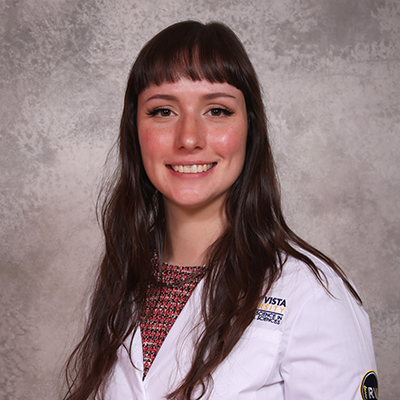
MSBS Class 2025
Colorado Campus
Where is your hometown?
Wheat Ridge
Undergraduate studies:
Biology
What clubs and activities are you currently involved with?
I am interested in joining Student Council
Tell us a bit about yourself.
I was raised with a younger brother by my loving parents in the small rural town of Ocala, FL. I joined the vocational biotechnology program at my high school. I graduated from the University of Florida in 2020 with a Bachelor’s degree in Biology. At UF, I worked as a biotechnician assistant in a plant pathology lab studying disease resistance in citrus. After graduation, I decided to move to Denver because I love the seasons and mountains. I worked as a diagnostic lab technician for almost 3 years before joining the MSBS program. I enjoyed taking some time off to travel and gain experience in the workforce. My partner and I love taking my goofy hound dog, Stinky, hiking and camping in the mountains.
What initially brought you to RVU? Why did you decide to pursue this degree?
I always wanted to be a doctor and discovered pathology in high school, when I found my passion for biotechnology. I enjoyed spending 6 years as a lab technician. I will never forget my experiences shadowing pathologists at UF. The memories have kept me motivated through the difficulties of my journey to medicine. Coming from a small school, I struggled with the competitive undergraduate academics at a large university. My uncompetitive GPA made it difficult to get into medical school and I was completely rejected after my first round of applications. I felt determined to persevere and do whatever it takes to achieve my goals. I am so grateful for the opportunity presented to me in the MSBS program. The faculty and my peers are the most emotionally and academically supportive system I’ve ever encountered. I am determined to not only succeed but exceed in my journey at Rocky Vista.
What do you enjoy doing when not at RVU (family life, interests and hobbies)?
After studying, you can find me playing video games with my friends and streaming on Twitch. I enjoy live music and festivals. Enjoying music and painting are my favorite ways to relax when it’s too cold to go hiking or camping with my dog.
What is an interesting or little known fact about you:
I was the president of my high school chapter of Future Farmers of America. I helped raise chickens, goats, lambs, and pigs and gardened with my father. Most of my undergraduate research was in horticulture and plant pathology. I was studying disease resistance in citrus and helped my mentor with citrus breeding projects that aimed to create cultivars with resistance to the citrus tristeza virus. During the pandemic, research was put on hold so I worked in commercial horticulture and lived out the farmer lifestyle. Today, my passion for horticulture manifests as a jungle of houseplants in my home, but one day I hope to cultivate my own land.
What is the best piece of advice you have been given by a professor or student while at RVU?
The MOST important advice: “Don’t change your answer!”
But also, make time for yourself. Don’t neglect your human needs. You can’t study effectively when you’re hungry, sleep-deprived, and burnt out. Make time to do the things you love. It is harder to put the work in when I deprive myself of time to be a person instead of a student.
What are your medical interests?
I am interested in Pathology because I love the lab setting in a clinical context. As a lab tech, I loved providing patients with answers to their illnesses. I have also considered forensic pathology after my experience as an autopsy intern with the Denver Office of the Medical Examiner. While shadowing pathologists during undergrad, I appreciated the collaborative effort between pathologists to reach diagnoses and they do not have to specialize unless they choose to. I am interested in the variety of work that pathology offers.
What is a favorite memory you have from being in RVU?
I remember feeling touched the first time Dr. Towne told us “You belong here.” Those three words were the perfect remedy for the imposter syndrome I felt in the back of my mind during the first week of the MSBS program. As the program has progressed, that sense of belonging has permeated the student body. We belong here.
What advice do you have for prospective students?
Don’t be afraid to take the chance and invest in yourself. If you are determined and resilient, you belong here. If you are stubborn enough, you can achieve anything. The only way to fail is to not try at all.
Samantha Williams
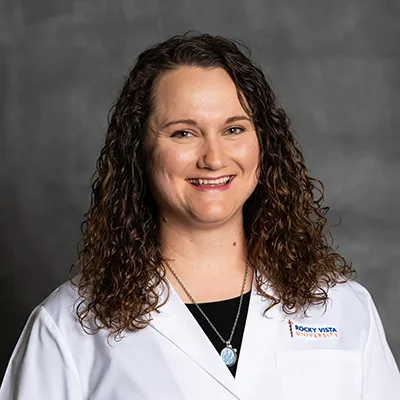
MSBS Class 2024
Utah Campus
Where is your hometown?
Bandera
Undergraduate studies:
Bachelors of Science in Emergency Health Sciences
What clubs and activities are you currently involved with?
Various Volunteer Activities
Tell us a bit about yourself.
I am from Bandera, a small town in the Hill Country of South Texas. We are known as the “Cowboy Capital of the World.” My parents still currently reside there; my younger and older brothers have moved on to other places. I joined the Future Farmers of America and 4-H in school and participated in a lot of different activities, from horse and livestock judging competitions, livestock shows (sheep, goats, rabbits), as well as numerous volunteer activities. I wanted to become a veterinarian and began college with that goal, but wasn’t prepared to do the hard work to succeed there. I enlisted in the Army and almost completed Basic twice, but was separated due to a foot injury. At that point, I was unsure about what to do next, but had heard about a free Emergency Medical Technician-Basic class and decided to take a chance on it. I am so grateful I did! I have been able to give back to the community that helped raise me and which I dearly love. My 12 years as a Paramedic is what pushed me to want to become a doctor and what ultimately led me to RVU.
What initially brought you to RVU? Why did you decide to pursue this degree?
I was on a road that seemed to just keep going around in a large circle—what I like to refer of as the toilet bowl flush. I had applied to several medical schools and had just received the dismal results of my fourth MCAT. Plus, getting the “We’re sorry to inform you…”, “Try again next year…” rejection letters were the kicks that kept on coming. I knew I wanted to become a doctor, but if I couldn’t even get past the MCAT, what more could I do? I was visiting with my medical director while on a 48-hour shift at our EMS station when she asked me about applying to Master’s degree programs. I was completely unaware of these and began to research options. I found several programs that interested me and applied to all of them. Happily, I was accepted into each one! Then it became time to narrow down the choices. When I initially contacted RVU-UT, I was put in touch with the Utah Program Coodinator. She was amazing and went out of her way to encourage me, as well as to be helpful to me. I did a campus visit and that convinced me RVU was the right place for me. Additionally, the pipeline opportunity associated with the College of Medicine made the idea of medical school more achievable.
What do you enjoy doing when not at RVU (family life, interests and hobbies)?
Coming here from Texas without family in the area has been an interesting journey for sure! I have come to enjoy walking, seeing the amazing landscapes, finding a church community, and participating in various workout activities, including sound therapy and yin yoga.
What is an interesting or little known fact about you:
I am a MIXXED Fit certified dance instructor. I have also participated in the Bataan Memorial Death March at White Sands Missile Range in NM several times (truly a very humbling experience).
What is the best piece of advice you have been given by a professor or student while at RVU?
There are actually a few things I want to share:
1. Structure = Function.
2. Remember you still have to eat all your pancakes. Do you want to eat them all at once or a couple at a time?
3. Find balance and enjoy the journey. This is a marathon not a sprint.
4. Come to Utah!
What are your medical interests?
After working over 12 years as a paramedic in my rural community, I know I want to be a doctor providing care to underserved areas/populations in rural environments. I see myself working in both emergency and family medicine.
What is a favorite memory you have from being in RVU?
I have a couple of favorite memories. First, waking up in this incredible, awe-inspiring environment—the majesty of nature. It is so very different from my home in TX! Also, the bonds that have started forming within our cohort, and some of the best laughs.
What advice do you have for prospective students?
If you’re one of the ones like me who has been told “NO” so many times that you almost give up on your dream, realize it is possible! You just have to take a step and burn your boat—the only way to move is forward. This program is challenging, and at times can be incredibly stressful. However, it will be very rewarding as long as you put in the time to be successful. Know that this program is designed to help you succeed. The faculty and staff have truly been amazing and will try to move mountains to ensure you do well. At RVU, you are more than a number on a piece of paper or a dollar sign in the bank. I am so grateful to be here. I can’t even fathom where I would be if this program hadn’t come into my life.
Is there anything else that you would like to add?
Understand that if this was easy, everyone would do it. There are times that you will end up emotionally exhausted and wonder if this is truly what you should be doing. It is critical to know and understand your “Why?” of it all. This is such a long process and it is physically and mentally exhausting. While each person’s reason for coming may be different, I believe fundamentally we have the same goal — to leave the world better than we found it. What better way to do this than by helping your fellow man?
Mercedes Castillo
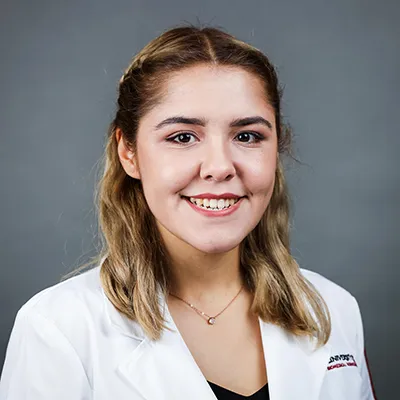
MSBS Class 2023
Utah Campus
Where is your hometown?
Huntington Park
Undergraduate studies:
Bachelors of Science in Biological Sciences
What clubs and activities are you currently involved with?
American Woman’s Medical Association, Latinx Club, Neuropsych Club
Tell us a bit about yourself.
Prior to moving out to Ivins, or “Mars” as some of us have lovingly dubbed it due to the vibrant coat of red sand around Rocky Vista University’s Utah campus, I’d lived in Southern California the entirety of my life. I got my Bachelor’s degree in Biological Sciences at the University of California Riverside. While there, I got the opportunity to attend free clinics situated in Tecate, Mexico, organized by a club called “Flying Samaritans”. I functioned as a volunteer Spanish-English translator for our volunteer physicians to communicate with their patients and vice versa. Prior to UCR, I attended community college in East Los Angeles where I also volunteered at the LAC+USC Hospital emergency department. I’ve wanted to be a physician for a long time, and my experiences both in Tecate, and in East L.A. cemented my hope to one day serve the underserved, especially belonging to an underrepresented minority in medicine.
What initially brought you to RVU? Why did you decide to pursue this degree?
I finished and received my Bachelor’s of Science during COVID; after that, I had to do some reevaluating. I knew I still wanted to be a doctor but I also knew that I needed to explore the options I had and what I could do to bolster my GPA. I looked into master’s degrees and that’s when I found out about MSBS. I got the opportunity to meet with Dr.Brooks and Holly Bagot, who I spoke with at length over Zoom and learned more about the program. When I applied and got in, I was ecstatic- no other campus made me feel as welcomed or as wanted as RVU. In my time here, I’ve learned what study approaches work best for me, and have done a lot of adjusting. I don’t think there’s a program out there that would prepare a person for the rigors of medical school -or provide the support to lead their students to success- as well as this one.
What do you enjoy doing when not at RVU (family life, interests and hobbies)?
I love reading books! My favorite author right now is Ali Hazelwood– she’s a real life neuroscience PhD that’s written peer-reviewed articles on brain science but has recently -and very successfully- tried her hand at writing romance novels where her main characters are always working somewhere in STEM. I have my dog Lola living with me out here, and she’s very hyper. I try to take her on walks 3-4 times a day for both our sakes! I love BTS (the kpop group) and listening to whatever new music Spotify decides I’ll probably like. I also have a PS4 which I don’t get to use often, but my favorite games include the Last of Us franchise, and Detroit: Become Human.
What is an interesting or little known fact about you:
I graduated high school at 16! It’s little known because I just forget that it happened. From a young age, I was fixated on medicine (and how long of an academic path it would be) and when the opportunity presented itself to take the CHSPE and conclude high school after sophomore year, I took it and ran with it. After that, I went to community college before transferring to UCR where I got my bachelor’s degree… and now I’m at Rocky Vista University!
What is the best piece of advice you have been given by a professor or student while at RVU?
“No one cares when you learned to tie your shoes” is probably a piece of advice that had made its rounds every few weeks when imposter syndrome is hitting the hardest. Dr. Brooks is the one who’s told me this and the gist of it is that regardless of how long it takes you to get to where you want to be, you WILL get there. Once you’re a doctor or whatever else you aspire to be, no one will be asking how long it took.
What are your medical interests?
I’ve always been interested in endocrinology. I was diagnosed with T1 Diabetes a few years ago, and have to see an endocrinologist regularly to discuss treatment regimens. I also like psychiatry and neurology quite a lot. I assume my medical interests might change over time, especially the more I get to learn about the human body.
What is a favorite memory you have from being in RVU?
One of my favorite memories at RVU has been standing in a circle with friends outside of the school after each Block exam. We’re all joking and venting and a little scared of what results we’ll see when grades get released. We’re also relieved that it’s over and we’re figuring out how to celebrate. It sounds a bit mundane but being in this program has allowed me to really bond with my peers and I’ve never had that experience before. It’s a tight-knit community and we’re all working together and lifting each other up; the mutual support is real.
What advice do you have for prospective students?
This program is going to be one of the hardest things you’ve done up until now; you’ll struggle and there’s a learning curve to finding what works for you in terms of studying. Every one has their own approach and it might take a while to find yours. If your first exam grade isn’t what you wanted, find out what other people are doing and adjust. No one is walking in knowing everything- so don’t be hard on yourself if you have a hard time. Get comfortable asking for help, going to office hours, and putting in the extra time to learn that one thing that everyone “seems” to get. You have to be bad at something before you can get really good at it.
Daniel Steele

MSBS Class 2023
Colorado Campus
Where is your hometown?
Birmingham, AL
Undergraduate studies:
Nursing
Tell us a bit about yourself.
I was born in Miami, Florida but raised in Birmingham, Alabama. After graduating high school in 2004, I attended Auburn University for a few years but did not graduate. Auburn is a great school and I loved being there, but I lacked the skills to manage full-time student life, part-time employment, and extracurriculars. I ended up leaving academia to work for a few years and figure out what direction I wanted to go with my life. I’ve worked all sorts of jobs over the years to sample different things and figure out my personal niche, and I ultimately landed a medical scribe position in the ED that catapulted me into the health sciences. I earned Associates and Bachelors degrees in Nursing and worked as an RN full-time for the better part of the last 10 years – mostly in the Emergency Department. I had the opportunity to do travel nursing intermittently over the years, traveling the US and squeezing in a few international trips as well. I felt the pull of medicine ever since the early days of my nursing career, and in 2019 decided to finally scratch that itch and actively pursue medicine. It’s been a long 3+ years trying to get to medical school, but now being in the MSBS I am finally in the home stretch!
What initially brought you to RVU? Why did you decide to pursue this degree?
I applied to the COM in the 2021-2022 cycle but was not offered an interview. I emailed and called the admissions office to insist that they take a second look at my application, which they kindly declined, but followed up with “you might be interested in our Master’s in Biomedical Sciences program”. I attended a virtual info session with Dr. Towne and Courtney Campbell which really caught my attention as a great means of bolstering my knowledge! The opportunity to get a half-step further towards medical school made the decision a no-brainer!!
What do you enjoy doing when not at RVU (family life, interests and hobbies)?
My wife is a Veterinary Medicine student at CSU in Fort Collins, so I spend a lot of weekends in FoCo studying with her and drinking way too much coffee while we both stress about how to digest all this material! When I’m not studying or commuting, I like to cook and try new recipes, try new wines, or go rock climbing. Climbing is definitely my #1 hobby and favorite way to enjoy the natural world around us.
What is an interesting or little known fact about you:
I grew up being immersed in music from an early age – choral ensembles, symphonic band, jazz band, and marching band. I took that all the way to the collegiate level and marched in the band at Auburn University. I absolutely LOVE music, though I no longer perform or play any instruments. I miss it sometimes, but climbing took over about 15 years ago and I don’t regret that in the slightest 🙂
What is the best piece of advice you have been given by a professor or student while at RVU?
From Dr. Roberts before our first block exam this semester: “Remember, your score is just a data point and does not define your value as a person. Tomorrow is just another step on your journey.”
This really struck me because I have found we humans tend to wrap our identity and value up with our performance. However, the fact is, how we carry ourselves daily and how we treat others offers a better picture of who we truly are, and has nothing to do with our exam grades or GPA.
What are your medical interests?
I frequently daydream about working rurally and serving a smaller, spread-out community. With that said, I am keeping my mind open as I progress to the next phase. I’ll also add that since leaving the emergency department to pursue this master’s degree, I frequently find myself missing that setting and fast-paced atmosphere. So, Rural Medicine vs Emergency Medicine? Who knows?!
What is a favorite memory you have from being in RVU?
It’s hard to pinpoint a single memory from being at RVU so far, but I can confidently say that one of my favorite parts of being at RVU is the support that everyone exudes. The faculty and administrative personnel are so helpful and encouraging, and on top of that my peers are all super motivated and I find that incredibly inspiring and contagious. The atmosphere at RVU is perfect for staying focused and disciplined, and that is one of my favorite parts of being a student here.
What advice do you have for prospective students?
I will share a Calvin Coolidge quote that my grandfather bequeathed me as a young man: “Nothing in the world can take the place of Persistence. Talent will not; nothing is more common than unsuccessful men with talent. Genius will not; unrewarded genius is almost a proverb. Education will not; the world is full of educated derelicts. Persistence and Determination alone are omnipotent. The slogan “Press On” has solved and will always solve the problems of the human race.”
Is there anything else you would like to add?
RVUCOM Class of 2027 or bust!
Kathleen Villaluz
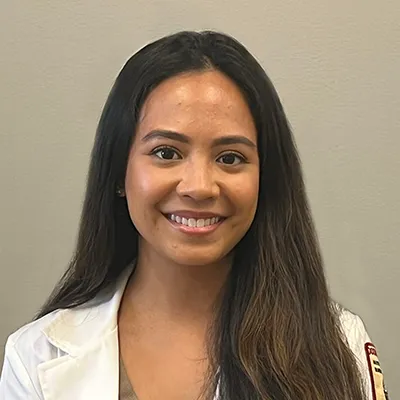
MSBS Class 2023
Utah Campus
Where is your hometown?
Las Vegas, NV
Undergraduate studies:
B.S. in Biological Sciences
Tell us a bit about yourself.
I was born in Chicago, IL but grew up in Las Vegas, NV. I come from a big family with 3 brothers, tons of cousins, and the most supportive parents you could ask for! We are all super close and grew up living within 5 minutes from each other. Since coming from a larger city, it has been a little bit of an adjustment moving to Utah, but I can’t complain when my backyard is literally a beautiful red mountain! I graduated from the University of Nevada, Las Vegas with a Bachelor’s in Biological Sciences, and I have always had an interest in pursuing medicine, but would always contemplate the different avenues to practice medicine. After a few years of working and volunteering at various healthcare settings, I decided to seriously pursue my dreams and am grateful to be in the MSBS program!
What initially brought you to RVU? Why did you decide to pursue this degree?
A physician that I was shadowing was an alumni from RVUCOM and brought up the MSBS program, so I started researching more about the program and decided to apply. From the start of the application process, I felt so welcomed and supported by the faculty and it definitely made a huge impact on my decision to pursue this degree specifically at this university. I truly believe that my success and enjoyment during this program is partly because of how supportive everyone has been here– choose people (and a program) that choose you!
What do you enjoy doing when not at RVU (family life, interests and hobbies)?
Since I am very close with my family and luckily Las Vegas is only a 2 hour drive from Ivins, whenever I have a “golden weekend” I will usually drive home to relax with family and friends. I also have 2 adorable pups, a chihuahua and yorkie, that I love to take on walks and spend time with. Some of my hobbies include hot pilates/yoga, self-care days like getting facials, and since moving to Utah I’ve really enjoyed climbing and playing pickleball with friends.
What is an interesting or little known fact about you:
My family is from the Philippines and I am really proud of my culture. Growing up, I would take yearly trips to the Philippines so now I can fully understand the dialect, but it is a bit harder for me to speak the language fluently. However, when I spend a few months in my parent’s hometown, it becomes easier for me to pick up the language. I hope to fluently speak the language one day, and apply aspects of the Filipino culture to advocate for diversity in medicine.
What is the best piece of advice you have been given by a professor or student while at RVU?
The best advice that I have received while at RVU hasn’t been from one specific professor, but throughout my time here I’ve always heard, “Be confident and know that you are meant to be here.” This has stuck with me because there have been many times when I’ve felt the infamous “imposter syndrome,” but when I think back to this advice it reassures me that I’m in this program for a reason and to have the confidence in all the hard work I’ve done. Like I’ve said previously, the faculty and staff at RVU have continuously been so supportive and encouraging that it’s hard not to have the confidence in yourself to do the best you can.
What are your medical interests?
I’ve been interested in sleep medicine and how it relates to various diseases and disorders, but I’m also keeping an open mind once I get more exposure to different specialties!
What is a favorite memory you have from being in RVU?
My favorite memory from being in RVU so far has just been the camaraderie that I’ve made with my classmates these last few months. For me, building these friendships has made such a positive impact in my time during the program. In Utah, we have a small cohort so we are all comfortable with each other and like to joke around whenever we can, which helps keep things fun during stressful block weeks.
What advice do you have for prospective students?
My advice for prospective students is that balance is key! Work hard and have discipline with your studies, but also know when to relax and take some time to enjoy yourself during the program. The next 9 months are intense, but they also will fly by so quickly and at the end of this, you’ll hopefully have a few new skill sets and experiences that can help you with your future endeavors.
Abhishek Rauniyar

MSBS Class 2023
Colorado Campus
Where is your hometown?
Garuda, Nepal
Undergraduate studies:
Bachelors of Science in Biology, Minor in Psychology and Chemistry
Graduate studies:
Master of Public Health in Global Health Epidemiology
Tell us a bit about yourself.
I was born and raised in a rural village in Garuda, Nepal. I immigrated to the U.S. at the age of 17. My desire to pursue a career in medicine and public health started from my experiences with inequitable healthcare systems in Nepal and the U.S. My journey to medicine has been very bumpy but full of great experiences. I received my Bachelor of Science in Biology with a minor in Psychology and Chemistry from the University of Colorado Denver. Afterwards, I finished my Masters of Public Health in Global Health Epidemiology from the Colorado School of Public Health. This led me to a once-in-a-lifetime opportunity to be at the forefront of a pandemic response. Before coming to the MSBS program, I worked as an Epidemiology Branch Manager at the Colorado Department of Public Health and Environment serving 30+ local health departments and their COVID response team. Throughout this time, my continued efforts to get into medical school were unsuccessful. The MSBS program provided another opportunity to pursue my passions.
What initially brought you to RVU? Why did you decide to pursue this degree?
Two of my close friends are alumni of the MSBS program who started in the COM this fall. They played a major role in my decision to pursue this degree at RVU. I initially applied to the COM directly and was not offered an interview. Afterwards, my friends talked to me about the MSBS program and how it could provide another pathway for medical school.
What do you enjoy doing when not at RVU (family life, interests and hobbies)?
I enjoy exploring Colorado and outdoor adventures. When I need to destress, I often take a ride up to the mountains and go on a hike with my friends. I also really enjoy cooking and hosting my friends over for dinner. Sometimes, I use my Pomodoro breaks between studying to play chess (and, yes, it does help me relax and destress). My girlfriend, who is also in the MSBS program, loves going on Costco dates with me when we can’t go to the mountains.
What is an interesting or little known fact about you:
Something that I find very interesting about my early life is that my house in Nepal had a water pump installed by the WHO. Back then, this pump was the only source of clean water for the entire village. It was such a simple intervention that likely saved several lives in that village, including mine. This is also where my interest in public health started.
What is the best piece of advice you have been given by a professor or student while at RVU?
Professors and students while at RVU have reminded me that scores do not define us or determine whether or not we will be better doctors. Our experiences, curiosity, and willingness to learn more are what shape us to keep growing. The current academic metric system often limits us, but we are so much more than our scores.
What are your medical interests?
Based on my past experiences, I have gathered that I thrive in emergency responses where things are changing and moving fast. I also want to use my skills and knowledge to serve the global community. As of right now, I am interested in either general surgery or emergency medicine but I am also keeping an open mind as I learn more about other specialties in medicine.
What is a favorite memory you have from being in RVU?
My favorite memory thus far from being in RVU is gathering by the glass window to get some sunlight. Some of us gather here during our 10-minute breaks between classes. We laugh, vent, and talk about almost everything in the world. These 10 min breaks help us get through even the most stressful weeks. We talk about our weekend plans, food recipes, recent travels, Celsius and its impact on our grades, and how Minnesota names its snow plows. The common theme here is that we take a fun study break.
What advice do you have for prospective students?
I know from my own experience, how hard it can be to navigate the process of getting into medical school, especially if you are a first-generation student. My advice for prospective students is to stay persistent and determined. Don’t be afraid to ask questions and make mistakes. This is how we learn and grow. MSBS program is a very intense 9-month program but it also guides you on how to become a well-prepared medical student. You learn so many new student skills and discover a supportive environment around you. Best of all, you can bypass MCAT.
Meet the people who can be by your side
At RVU we foster an emphasis on community that drives positive outcomes for our students, and the faculty and staff play a key role in that culture. Our doors—and inboxes—are always open.
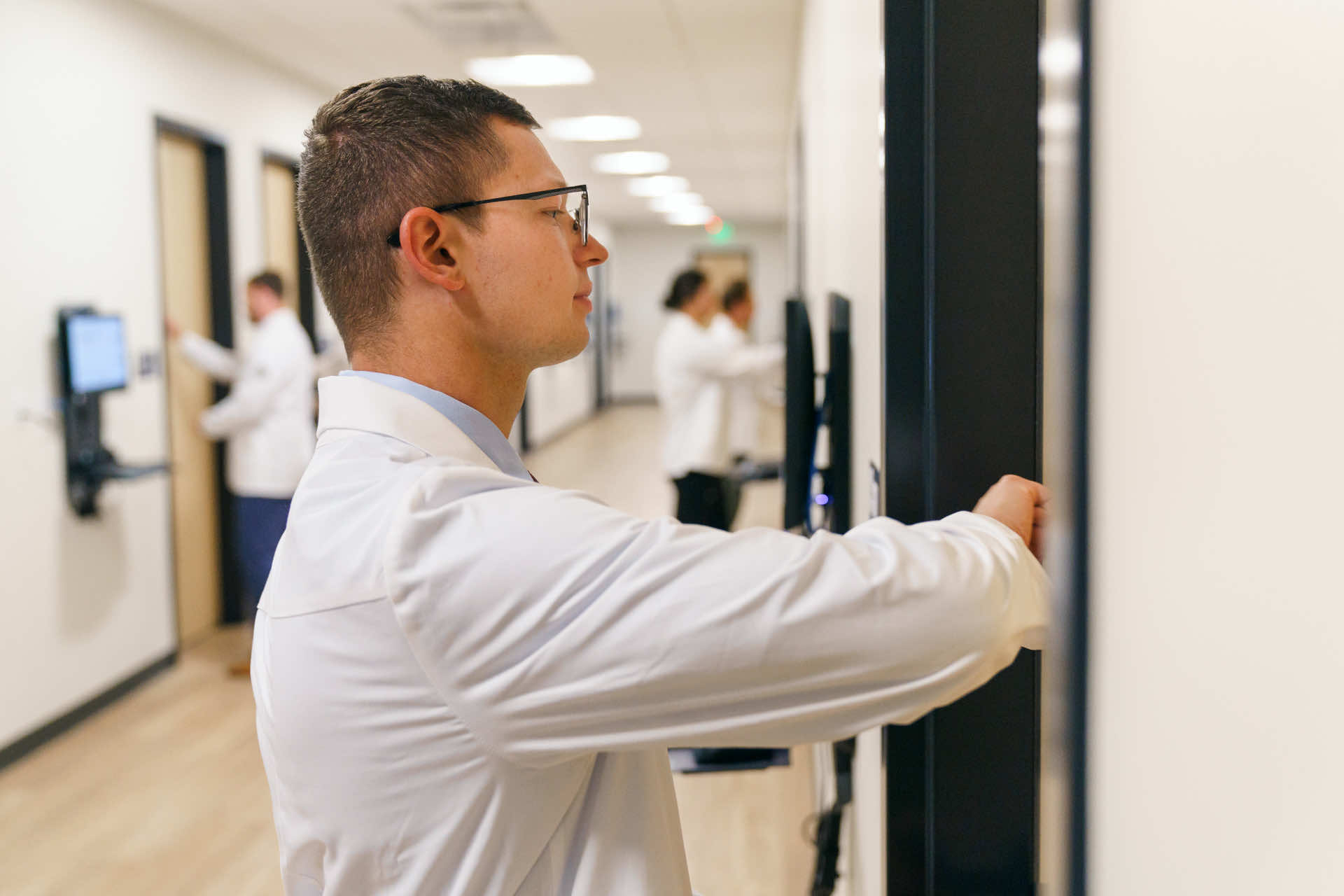
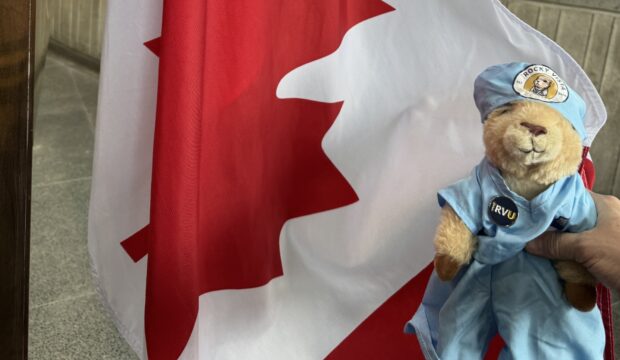
Master of Science in Biomedical Sciences
Celebrating Canada Day: Reflections from RVU’s Canadian Students
Read more- Master of Science in Biomedical Sciences
The Healing Practice: Yoga as a Tool for Medical Student Well-Being
Read more- Master of Science in Biomedical Sciences
Applying to RVU’s Master of Science in Biomedical Sciences Program? Here’s What You Need to Know
Read more- Master of Science in Biomedical Sciences
June is Brain Awareness Month: How to Keep Your Mind Sharp as You Age
Read moreDiscover the RVU difference
We are proud of your accomplishments and hope you enjoy reliving this occasion.
Contact the Office of Admissions
Colorado Campus
8401 S. Chambers Road
Englewood, CO 80112
303-373-2008
For faster response, please direct inquiries to: [email protected]
Utah Campus
255 E. Center Street
Ivins, UT 84738
435-233-9550
For faster response, please direct inquiries to: [email protected]
*Based on internal data as of August 2024

